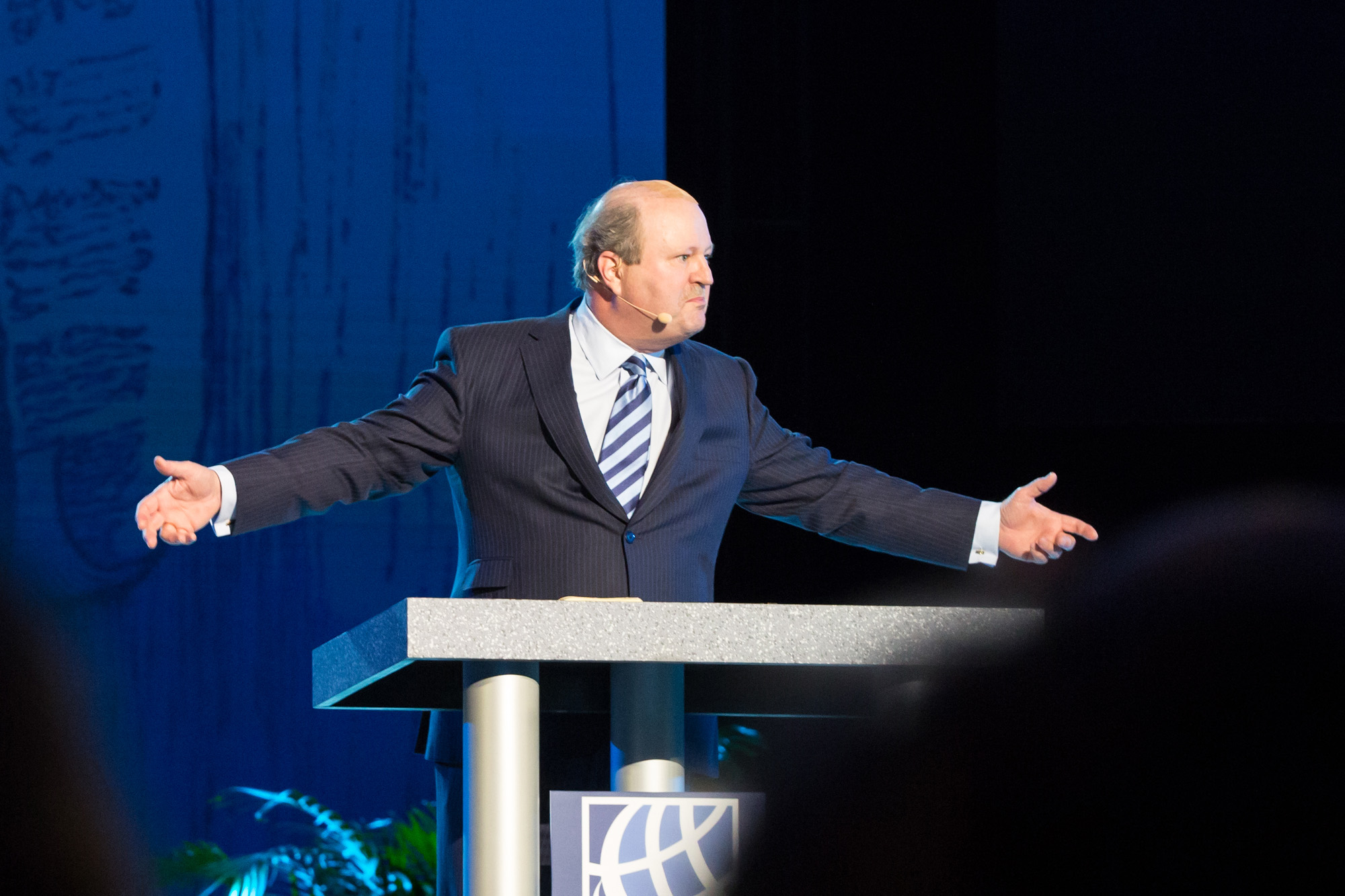
ORLANDO, Fla. (BP) — The five “solas” of the Protestant Reformation were highlighted during the National Religious Broadcasters’ “Proclaim 17” convention to mark the 500th anniversary of Martin Luther’s 95 Theses.
Tony Evans, senior pastor of Oak Cliff Bible Fellowship in Dallas, preached on “Sola Gratia” (by grace alone) during the NRB International Christian Media Convention, Feb. 27-March 2 in Orlando, Fla., with Erwin Lutzer, pastor emeritus of Moody Church in Chicago, addressing “Sola Fide” (by faith alone); Mac Brunson, senior pastor of First Baptist Church in Jacksonville, Fla., on “Solo Christo” (through Christ alone); R.C. Sproul, founder and chairman of Ligonier Ministries, on “Sola Scriptura” (by Scripture alone); and Barry Creamer, president of Criswell College in Dallas, on “Soli Deo Gloria” (glory to God alone).
By Grace Alone
Evans preached from Ephesians 2:1-10, noting that the Roman Catholic Church had been trying for centuries to get people to atone for their sins through indulgences and other means, but Luther proclaimed that biblical acceptance with God was by grace alone.
“At the heart of grace is unmerited favor,” Evans said. “Grace can be defined as the goodness of God to people who do not deserve it, could never earn it and could never pay it back. For it is the God of grace that offers His goodness to undeserving mankind.”
Knowing that man would sin, God “had to come up with a plan for His attributes to get along,” Evans said, meaning justice and wrath would have to be at peace with the expression of love and mercy.
“Since He could not look to His creation in order to resolve the problem because the creation was the problem, He had to come up with an answer to address the conflict within the attributes given the sinfulness of man combined with the desire of God expressing His love,” Evans said. “And so He came up with a plan to resolve the problem in Himself, by Himself, for Himself to benefit mankind who could not help themselves because they were stuck in a graveyard.”
Evans said that Jesus, by grace, says to believers, “You’re with Me, and the rights and privileges of grace get transferred to you, not because of who you are but because of who I am.”
By Faith Alone
Luther struggled with a sense of alienation from God, Lutzer said, noting, “Imagine the freedom that Luther was finally able to have when he said, ‘My sin doesn’t belong to me. It belongs to Jesus.'”
What Luther discovered, Lutzer said, “was the Gospel itself buried under centuries of traditions and prayers and candles and all of those things.”
“The truth was there,” Lutzer said. “The Catholic Church believed in Jesus Christ as God, they believed in the Scripture, though tradition usually trumped the Scripture. But the fact was, it was all there and the reformers came along and weeded the garden.”
Lutzer noted five characteristics of saving faith: It involves the acknowledgement of personal sin; the understanding that Jesus died to take our penalty; a transfer of trust to Jesus Christ alone; a growth in faith; and, as a consequence, good works.
“The Jesus who saved you is just as strong and just as trustworthy as the Jesus who saved me or anyone else,” Lutzer said.
Through Christ Alone
 Brunson cited Hebrews 1:3 in describing Jesus as “the radiance of the glory of God and the exact representation of His nature,” and noted, “That doesn’t happen with anyone else.”
Brunson cited Hebrews 1:3 in describing Jesus as “the radiance of the glory of God and the exact representation of His nature,” and noted, “That doesn’t happen with anyone else.”
He pointed to the exclusivity of Christ’s redemptive activity recorded in Hebrews 10:4, which states, “For it is impossible for the blood of bulls and goats to take away sins.”
“All of that sacrifice for all of those years never dealt with a single sin of the Jews,” Brunson said.
“Christ came in not only as High Priest to offer up the sacrifice,” he added. “He offered Himself up as the sacrifice because Christ and Christ alone can die for sins. Nobody else has ever tried.
“You don’t read that in the Koran,” Brunson said. “Allah doesn’t give that a shot. Neither does Mohammad, Krishna, Buddha, Shiva, any of the Hindu gods. Not even Shirley MacLaine. Nobody can die for sins but Jesus Christ, and He makes purification of them, and to show how complete that is, He sits down.”
By Scripture Alone
It’s customary, Sproul said, for historians to indicate two chief causes of the Protestant Reformation: the material cause and the formal cause.
“We know that the material cause of the Reformation, or the question of what was the matter at the time, focused on the issue of the Gospel and the answer to the question, ‘How are we as unjust people justified in the presence of a holy God,'” Sproul said. “So the central material aspect was the debate over the issue of justification by faith alone.
“But throughout that discussion of the material principle of the Reformation, there was always just beneath the surface — and quite frequently bubbled to the surface of the controversy — the issue of the formal cause of the Reformation, and that issue was the question of authority,” Sproul said. “By what authority did Luther declare his doctrine of justification by faith alone?”
Luther said he had been captured by the Word of God. “My conscience is bound by sacred Scripture, and to act against conscience is neither right nor safe. Here I stand. I can do no other. God help me,” Sproul said, noting the great reformer’s famous assertion.
“What Luther said in the 16th century and what we say today is — as important as the instruction that we received from the great theologians of the past, from the commentaries, from the creeds, from the confessions — there’s only one source that has the authority absolutely to bind our consciences. It’s sacred Scripture,” Sproul said.
If believers want to realize an awakening or a sort of new reformation in this day, Sproul said, “what we’re going to have to see are Christians whose consciences have been captured by sacred Scripture and can say, ‘Here we stand. We can do no other.'”
Glory to God Alone
 The fifth sola “is actually unique for a couple of reasons,” Creamer pointed out. “The other four are all means to salvation itself. This one is different. The glory of God is not the means of salvation. It is the purpose of salvation, and to that extent, it applies to all the others together.”
The fifth sola “is actually unique for a couple of reasons,” Creamer pointed out. “The other four are all means to salvation itself. This one is different. The glory of God is not the means of salvation. It is the purpose of salvation, and to that extent, it applies to all the others together.”
Creamer cited “an objective sense of God’s glory that is in Him. That is, the attributes of God that lend to His gravity are His glory. They just belong to Him. But then there is a sense in which we use the word ‘glory’ to talk about the appropriate response we have to that truth about God…. Our praise is of His glory.”
The glory of God is independent of man and is eternal, universal, objective and absolute, Creamer said, “but it’s not fully realized until we participate in it.”
Referring to Psalm 8:5, which says God crowned man with glory and honor, Creamer said God “bestows it on us, but He expects it to come back to Him. The fruit of our lives is only when we are consumed by Him.”
















